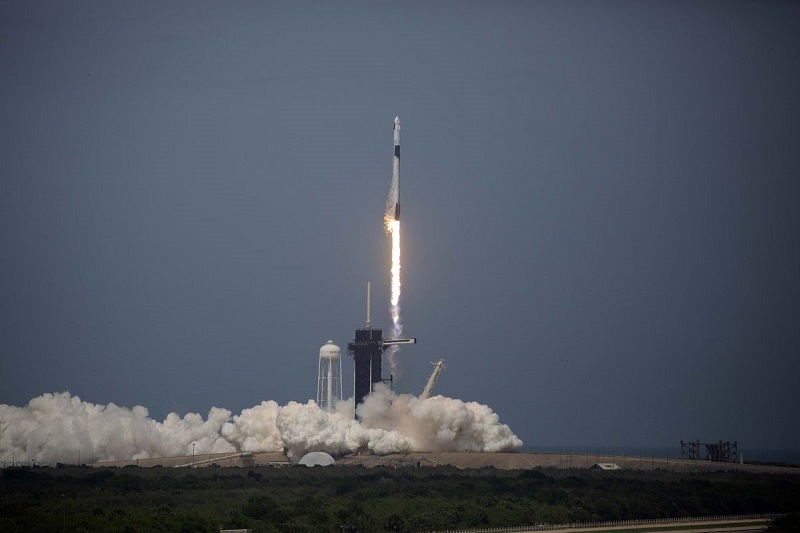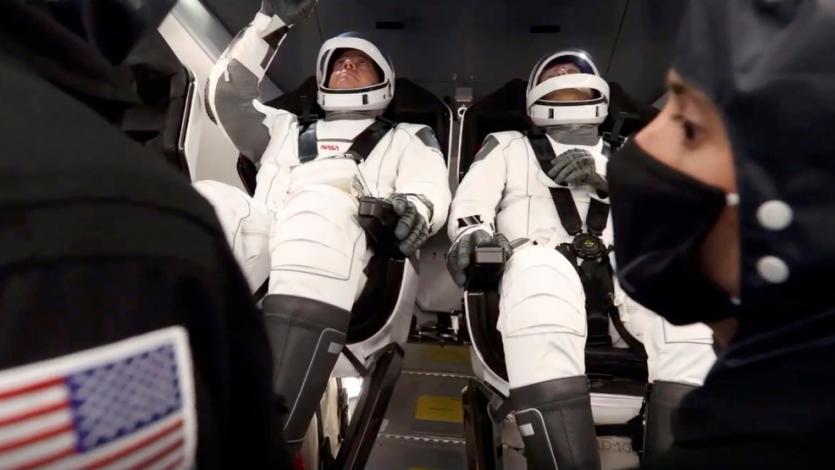May 27, 2020 image from video made available by SpaceX, NASA astronauts Bob Behnken, background left, and Doug Hurley perform communication checks in the Crew Dragon capsule before launch from the Kennedy Space Center in Cape Canaveral, Fla. (SpaceX via AP)
The SpaceX launch – what does it mean for the future?
By Patryk Krych | The World Daily | JUNE 1st 2020
The recent launch of the SpaceX programme marks the first launch of astronauts from United States soil in nine years, since the last launch in 2011. However, this is a space programme spearheaded not by NASA, but by company owner Elon Musk.
On Saturday, 30 May 2020, mankind made its first step towards commercial space travel, when the NASA-piloted ship -the Crew Dragon- launched and carried pilots Doug Hurley and Bob Behnken across the skies and into the Earth’s orbit, where it could later rendezvous with the International Space Station (ISS) for docking after a 19-hour trip.

The SpaceX Dragon Capsule Demo-2 sent two NASA astronauts to orbit on Saturday, the first time a private company has ever sent a crewed mission to space. Photo:GETTY
“For Doug, personally, he's worked so hard I mean through his entire life to get to where we are right now. As a test pilot, this would be the dream to fly a new vehicle. So, it makes me so happy to see that he gets to be part of this mission, as spacecraft commander. I'm just glad to see his hard work and his dreams come true for that,” said NASA astronaut Karen Nyberg, wife of Doug Hurley.
There have been attempts throughout the last decade to kick off a new generation of space travel – the commercial kind, where the space beyond the atmosphere of the Earth could be visited by regular citizens for a certain fee. A difficult idea to pull off for an entirely new experience that has yet to be vitalised. The launch of the SpaceX programme is step towards just that direction.
Similar programmes have also borne fruit in recent times, such as Richard Branson’s Virgin Galactic, which seeks to start commercial travel within the Earth’s atmosphere around its orbit, in more of a jet than a spacecraft. Virgin Galactic has also made headlines in recent news, after having signed an agreement with NASA to share their technologies and research in order to quicken to process of allowing commercial space travel, and exploratory space in general, to develop.
With Virgin Galactic having had successful testing, and now SpaceX with similar if arguably more profound achievements, it’s looking entirely possible that some form, perhaps the most basic form that is, of commercial space travel will develop within the following decade to change the way we comprehend space travel forever.
The very idea of commercial human spaceflight has since its very conception raised numerous and very important questions regarding legal, ethical as well as medical considerations that had to be taken up if it were to be brought into realisation. With regards to the health and safety of the commercial crew and civilian spaceflight participants in particular, the ‘medical’ aspects are very important, considering that were something to go wrong during one of these hypothetical commercial space flights, (as history has shown us, is a more common issue than we think) then the very lives of the crew and passengers may be at risk.
Were these health and safety issues to be curbed entirely, however, the idea of commercial space travel could well turn out to be an entirely thriving business prospect, which could potentially give rise to more companies with similar business goals, in a variety of travels from commercial suborbital, orbital, interplanetary and point-to-point space transportation.
With this SpaceX flight successful, it will allow room from here on to develop the entire concept under Elon Musk’s company and improve the technology to account for legality and safety measures that can still be evaluated and established. With one success comes the possibility to aim for the next one.
“I'm really quite overcome with emotion on this day, so it's kind of hard to talk, frankly,” Elon Musk stated in a post-launch press conference over at NASA's Kennedy Space Centre on Saturday evening. “It's been 18 years working towards this goal, so it's hard to believe that it's happened.”
“I think it was an argument that the return is more dangerous in some ways than the ascent, so in order to declare victory yet, we need to bring them home safely [and] make sure that we're doing everything we can to minimize that risk of reentry and return,” Musk added.
By Patryk Krych | © The World Daily 2020
Related: Virgin Galactic – One Step Closer to Space Tourism






